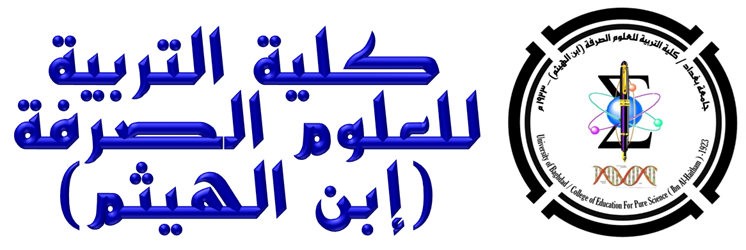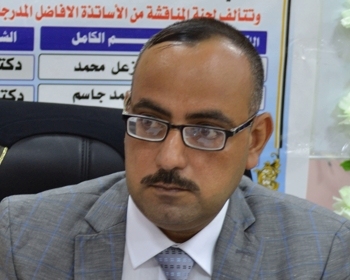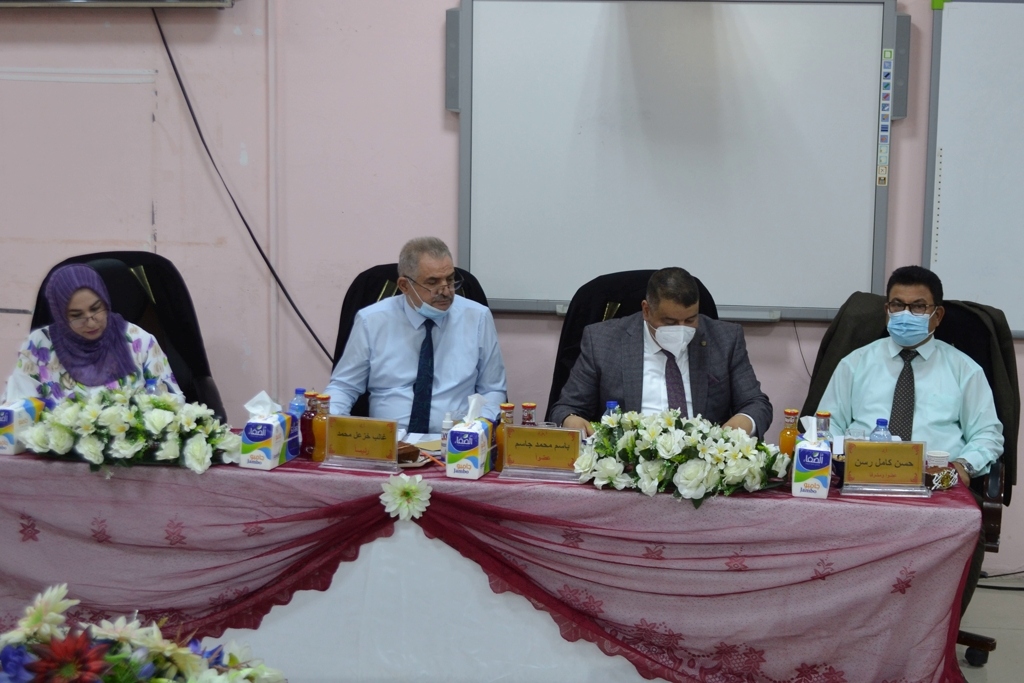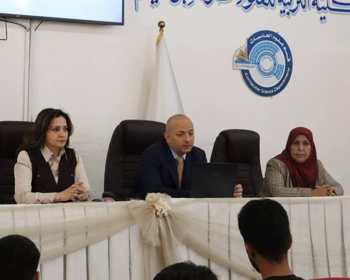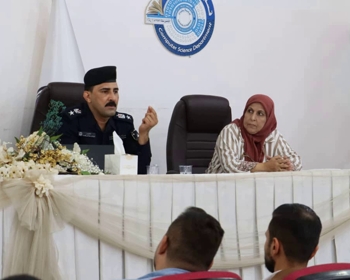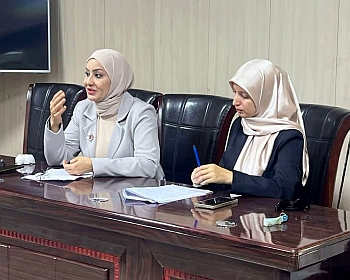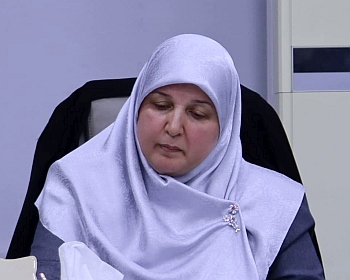ناقش قسم الرياضيات في كلية التربية للعلوم الصرفة (ابن الهيثم) رسالة الماجستير الموسومة (التفكير التحليلي وعلاقته بالذكاء المنطقي لدى طلبة الصف الخامس العلمي في مادة الرياضيات) في تخصص طرائق تدريس الرياضيات ، للطالب (احمد هاتف محيسن) التي انجزها تحت اشراف التدريسي في القسم (أ.د. حسن كامل رسن) ونوقشت من قبل أعضاء لجنة المناقشة المبينة أسمائهم في ما يأتي :
-
أ.د. غالب خزعل محمد (رئيسا)
-
أ.م.د. باسم محمد جاسم (عضوا)
-
أ.م.د. اريج خضر حسن (عضوا)
-
أ.د. حسن كامل رسن (عضوا ومشرفا)
ويهدف البحث الى التعرف على :
-
التفكير التحليلي لدى طلبة الصف الخامس العلمي في مادة الرياضيات .
-
الذكاء المنطقي لدى طلبة الصف الخامس العلمي في مادة الرياضيات .
-
طبيعة العلاقة الارتباطية بين التفكير التحليلي والذكاء المنطقي لدى طلبة الصف الخامس العلمي في مادة الرياضيات، وطبيعة هذه العلاقة حسب متغير الجنس (طلاب، طالبات) .
ومن خلال كون هدف البحث الحالي التعرف على طبيعة العلاقة الارتباطية بين التفكير التحليلي والذكاء المنطقي لدى طلبة الصف الخامس العلمي في مادة الرياضيات ومن اجل التحقق من الهدف اعتمد الباحث المنهج الوصفي لتوافقه مع طبيعة البحث وتم صياغة الفرضيات الصفرية الاتية :
1) لا توجد فروق ذات دلالة احصائية عند مستوى دلالة (0.05) بين متوسط الاداء الحقيقي ومتوسط الاداء الفرضي لدى طلبة الصف الخامس العلمي في اختبار التفكير التحليلي .
2) لا توجد فروق ذات دلالة احصائية عند مستوى الدلالة (0.05) بين متوسط درجات الطلاب ومتوسط درجات الطالبات في التفكير التحليلي .
3) لا توجد فروق ذات دلالة احصائية عند مستوى دلالة (0.05) بين متوسط الاداء الحقيقي ومتوسط الاداء الفرضي لدى طلبة الصف الخامس العلمي في اختبار الذكاء المنطقي .
4) لا توجد فروق ذات دلالة احصائية عند مستوى الدلالة (0.05) بين متوسط درجات الطلاب ومتوسط درجات الطالبات في الذكاء المنطقي .
5) لا توجد علاقة ارتباطية ذات دلالة احصائية عند مستوى دلالة (0.05) بين التفكير التحليلي والذكاء المنطقي لدى طلبة الصف الخامس العلمي في مادة الرياضيات .
6) لا توجد علاقة ارتباطية ذات دلالة احصائية عند مستوى دلالة (0.05) بين التفكير التحليلي والذكاء المنطقي لدى طلاب الصف الخامس العلمي في مادة الرياضيات .
7) لا توجد علاقة ارتباطية ذات دلالة احصائية عند مستوى دلالة (0.05) بين التفكير التحليلي والذكاء المنطقي لدى طالبات الصف الخامس العلمي في مادة الرياضيات .
تم تحديد مجتمع البحث والمتمثل بطلبة الصف الخامس العلمي(الأحيائي) في المديرية العامة لتربية القادسية وتم اختيار العينة بالطريقة العشوائية الطبقية اذ تكونت من (400) طالباً وطالبة وبواقع (176) طالباً و(224) طالبة وبناء أداتي البحث وهما (اختبار التفكير التحليلي واختبار الذكاء المنطقي) والتطبيق على العينة .
ثم اجراء التحليلات الاحصائية لفقرات الاختبارين والتأكد من الخصائص السايكومترية واستعمال الادوات الاحصائية المناسبة والحزمة الاحصائية (spss) لتحليل نتائج تطبيق الاختبارين واظهرت النتائج الاتية :
-
امتلاك طلبة الصف الخامس العلمي التفكير التحليلي حسب المتوسط الفرضي المعتمد .
-
لا يوجد فرق بين الطلاب والطالبات في امتلاكهم للتفكير التحليلي .
-
لا يمتلك طلبة الصف الخامس العلمي الذكاء المنطقي حسب المتوسط الفرضي المعتمد .
-
لا يوجد فرق بين الطلاب والطالبات في امتلاكهم للذكاء المنطقي .
-
توجد علاقة ارتباطية موجبة جيدة بين التفكير التحليلي والذكاء المنطقي لدى طلبة الصف الخامس العلمي في مادة الرياضيات .
-
توجد علاقة ارتباطية موجبة جيدة بين التفكير التحليلي والذكاء المنطقي لدى طلاب الصف الخامس العلمي في مادة الرياضيات .
-
توجد علاقة ارتباطية موجبة جيدة بين التفكير التحليلي والذكاء المنطقي لدى طالبات الصف الخامس العلمي في مادة الرياضيات .
وفي ضوء نتائج البحث الحالي تم وضع عددا من التوصيات والمقترحات التي تخص المجال التربوي ومجال البحث العلمي ومنها :
-
توجيه نظر القائمين على المؤسسات التربوية بإعداد المناهج الدراسية المختلفة التي تتضمن مهارات التفكير التحليلي ومجالات الذكاء المنطقي في مناهج الرياضيات ولجميع المراحل الدراسية وعدم الاقتصار على المعلومات فقط .
-
اجراء بحوث مماثلة على مجتمعات ومراحل دراسية أخرى لمعرفة مدى امتلاكهم للتفكير التحليلي والذكاء المنطقي وكذلك علاقة التفكير التحليلي مع انواع اخرى من الذكاءات المتعددة لمعرفة طبيعة العلاقة واتجاهها .
في ضوء النتائج التي تم التوصل اليها في البحث الحالي يوصي الباحث بالتوصيات الاتية :
-
توجيه نظر القائمين بأعداد المناهج الدراسية المختلفة ولجميع المراحل الدراسية على عرض المحتوى بطريقة تحفز الطلبة على اعتماد التفكير التحليلي .
-
الحرص على تقديم انشطة متنوعة تتضمن مهارات التفكير التحليلي ومجالات الذكاء المنطقي في مناهج الرياضيات ولجميع المراحل الدراسية وعدم الاقتصار على المعلومات فقط.
-
الاهتمام بتدريب الطلبة لاسيما المرحلة الاعدادية على مهارات التفكير التحليلي .
-
عقد دورات تدريبية للهيئات التدريسية تساعدهم في توظيف واعتماد التفكير التحليلي في الانشطة المدرسية واليومية الاخرى .
-
توجيه الهيئات التدريسية على بناء برامج تعليمية وتقديم المحتوى لطلبتهم بطريقة تزداد فيها المساحة العملية في المقررات الدراسية وعدم الاعتماد على الجانب النظري فقط من خلال تقديم نماذج تعتمد على اسلوب التفكير التحليلي والذكاء المنطقي التي يتم تدريب الطلبة عليها.
-
توجيه الطلبة على استخدام انماط التفكير المختلفة ومنها التفكير التحليلي في مواجهة المواقف والمشكلات التي يتعرضون لها في مختلف مجالات حياتهم اليومية .
-
ضرورة التركيز على تنمية الذكاء المنطقي لدى الطلبة ولجميع المراحل الدراسية المختلفة لكي يتمكن الطلبة من مواجهة الصعوبات والمواقف التي يتعرضون لها في حياتهم اليومية.
-
Analytical Thinking and Its Relationship to Logical Intelligence Among Scientific Fifth-Grade Students in Mathematics
By : Ahmed Hatif Mahassen Al-Omari
Supervised by: Prof. Dr.Hassan KamilResan Al-Kanani
Research Objectives :
The current research aims to identify:
Analytical thinking of fifth-grade students in mathematics.
Logical intelligence among fifth-grade students in mathematics.
The nature of the correlation between analytical thinking and logical intelligence among fifth-grade students in mathematics, and the nature of this relationship according to the gender variable (male and female students).
Summary of the research
The aim of the current research is to identify the nature of the correlation between analytical thinking and logical intelligence among fifth-grade students in mathematics.
There are no statistically significant differences at the level of significance (0.05) between the average real performance and the average hypothetical performance among the fifth grade students in the analytical thinking test.
There are no statistically significant differences at the significance level (0.05) between the average scores of male students and the average scores of female students in analytical thinking.
There are no statistically significant differences at the level of significance (0.05) between the average real performance and the average hypothetical performance of the fifth grade scientific students in the logical intelligence test.
There are no statistically significant differences at the significance level (0.05) between the average scores of male students and the average scores of female students in logical intelligence.
There is no statistically significant correlation at the level of significance (0.05) between analytical thinking and logical intelligence among fifth grade scientific students.
There is no statistically significant correlation at the level of significance (0.05) between analytical thinking and logical intelligence among fifth grade scientific students.
There is no statistically significant correlation at the level of significance (0.05) between analytical thinking and logical intelligence among female students of the fifth scientific grade.
The research community was identified, represented by the students of the fifth scientific (biological) grade in the General Directorate of Al-Qadisiyah Education, and the sample was chosen in a stratified random manner, as it consisted of (400) male and female students, by (176) male and (224) female students, and the construction of the two research tools (the Analytical Thinking Test and the Analytical Thinking Test). Logical intelligence) and application to the sample.
Then, the statistical analyzes of the two test items were carried out, and the psychometric properties were confirmed, and the appropriate statistical tools were used and the statistical package (spss) to analyze the results of the application of the two tests, and the following results showed:
Fifth grade students possess analytical thinking.
There is no difference between male and female students in their possession of analytical thinking.
Students of the fifth scientific grade possess logical intelligence.
There is no difference between male and female students in their possession of logical intelligence.
There is a good positive correlation between analytical thinking and logical intelligence among students of the fifth scientific grade.
There is a good positive correlation between analytical thinking and logical intelligence among students of the fifth scientific grade.
There is a good positive correlation between analytical thinking and logical intelligence among female students of the fifth scientific grade.
In light of the results of the current research, a number of recommendations and proposals have been developed that pertain to the educational field and the field of scientific research, including:
Directing the attention of those in charge of educational institutions to prepare the various curricula that include analytical thinking skills and areas of logical intelligence in mathematics curricula and for all academic levels and not be limited to information only.
Conducting similar research on other societies and stages of study to find out the extent of their possession of analytical thinking and logical intelligence, as well as the relationship of analytical thinking with other types of multiple intelligences to know the nature and direction of the relationship.
Recommendation :
In light of the results reached in the current research, the researcher recommends the following recommendations:
Directing the attention of those in charge of preparing the different curricula and for all academic levels to present the content in a way that motivates students to adopt analytical thinking.
Be sure to provide a variety of activities that include analytical thinking skills and areas of logical intelligence in mathematics curricula and for all academic levels and not be limited to information only.
Paying attention to training students, especially the preparatory stage, on analytical thinking skills.
Holding training courses for teaching staff to help them employ and adopt analytical thinking in school and other daily activities.
Directing the faculty to build educational programs and provide content to their students in a way that increases the practical space in the academic courses and not to rely on the theoretical side only by presenting models that depend on the method of analytical thinking and logical intelligence on which students are trained.
Directing students to use different thinking styles, including analytical thinking, in facing situations and problems they face in various areas of their daily lives.
The need to focus on developing the logical intelligence of students and for all the different academic levels so that students can face the difficulties and situations they face in their daily lives.
